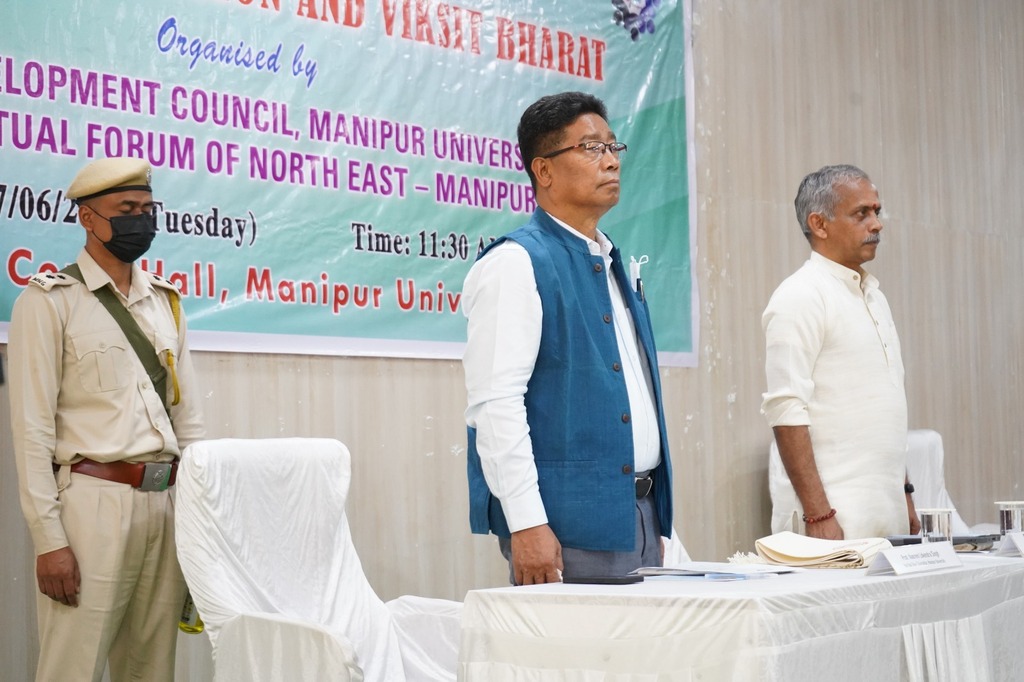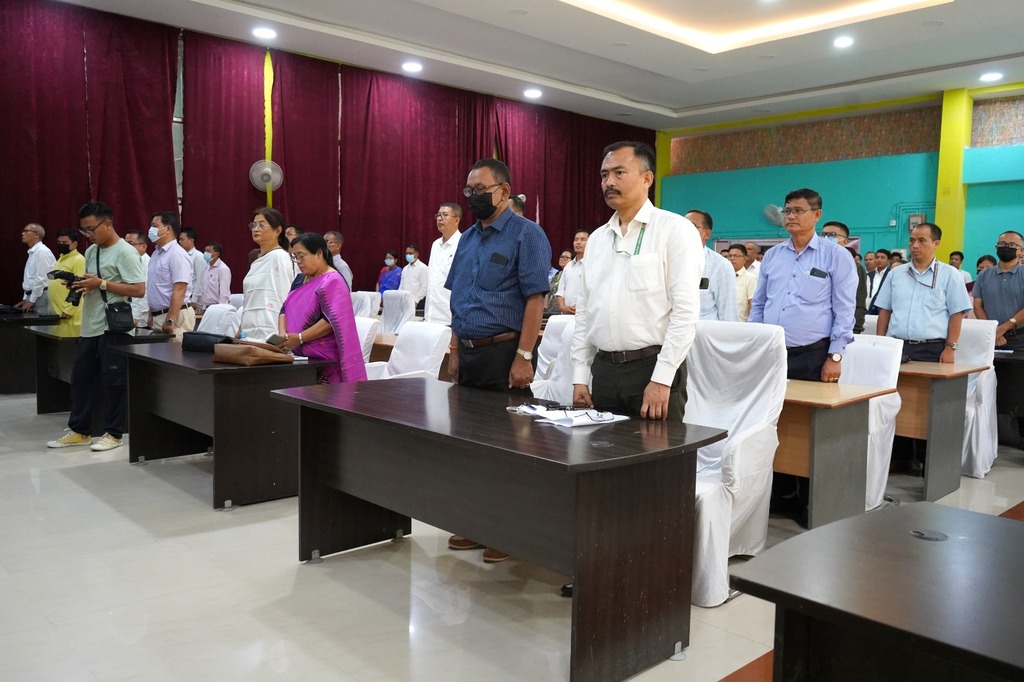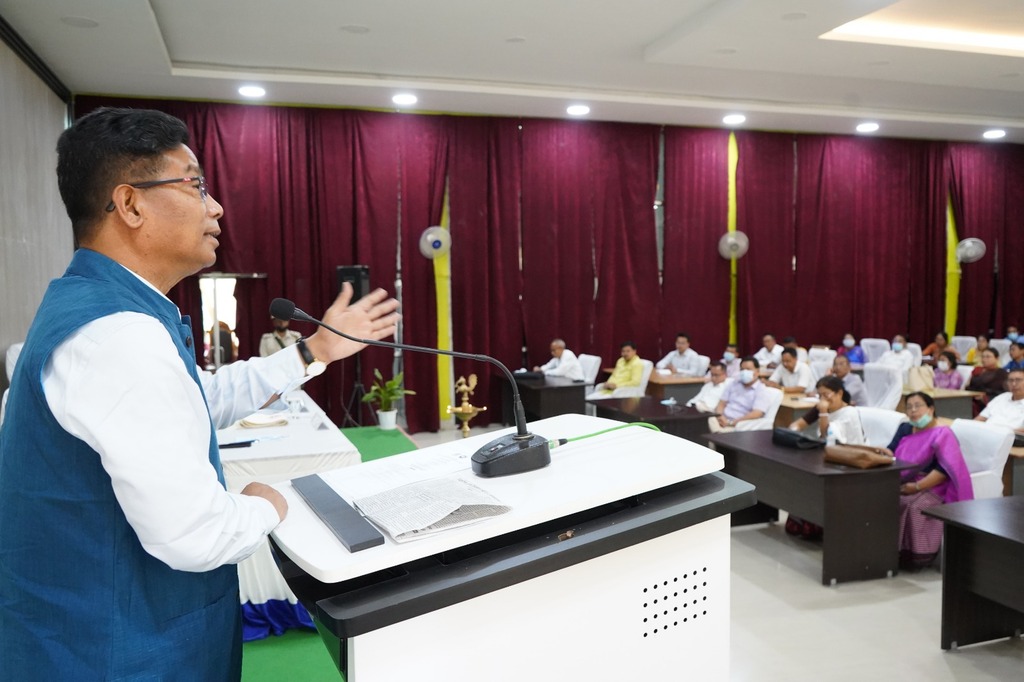Manipur University, June 17 – A public lecture on “Social Transformation and Viksit Bharat” was successfully held today at the Court Hall, Vice-Chancellor’s Secretariat, Manipur University, as part of the monthly lecture series conducted by the College Development Council (CDC), Manipur University, for college principals and faculty members of affiliated colleges.
The event was jointly organised by the College Development Council (CDC) and the Intellectual Forum of North East, Manipur. It is worth mentioning that CDC had earlier organised its first lecture in the series on the “Status of National Education Policy (NEP) 2020.”
The programme was graced by the Hon’ble Vice-Chancellor of Manipur University, Prof. N. Lokendra Singh, and noted author and poet Shri J. Nandakumar, National Convenor of Prajna Pravah, as presidium members. Prof. Hanjabam Shukhdeba Sharma, Director, CDC, delivered the keynote address. The event was attended by distinguished dignitaries, including principals and faculty members from various affiliated colleges of the University.
In his inspiring speech, Prof. N. Lokendra Singh urged the audience to broaden their perspective of Viksit Bharat, emphasizing that development should not be limited to economic growth alone but must include social transformation and structural reforms. Citing Dr. B.R. Ambedkar, he stressed that India’s challenges can be addressed through a deeper understanding of social realities and by empowering the underprivileged.
He advocated for a shift from Western-centric development models towards Indian perspectives rooted in culture and civilisation. Prof. Lokendra also emphasized the importance of integrating the Indian Knowledge System (IKS) into academia, noting its value in shaping national character and progress. He praised the Indian family system as a foundation for the country’s demographic dividend and intellectual strength.
Highlighting several government initiatives aimed at achieving the vision of Viksit Bharat, he pointed to youth empowerment, women’s development, strengthening internal markets, and zero tolerance towards terrorism as key priorities. He underscored the significance of Manipur’s contribution to this national vision and called upon academics to revisit and redefine development through Bharatiya perspectives.
Shri J. Nandakumar began his address by acknowledging the strong nationalist spirit of Manipur, noting its historical significance as the last princely state to come under British rule and the first to be liberated. He elaborated on the role of the Indian Knowledge System (IKS) in holistic national development, asserting that true development goes beyond political and economic freedom to include social liberation, in line with Ambedkar’s principles of Liberty, Equality, and Fraternity.
He rejected Western theorists’ depictions of India as backward, instead urging acceptance of India’s civilisational depth. Drawing on examples from Swami Vivekananda, Sri Aurobindo, and Mahatma Gandhi, he reinforced the idea that spirituality, service, and self-realisation are integral to nation-building. He also highlighted India's achievements in various sectors—defence, nuclear energy, women’s leadership (e.g., Operation Sindoor), and global economic standing—asserting that India’s transformation into a developed nation is within reach.
Prof. Hanjabam Shukhdeba Sharma, Director, CDC, in his keynote address, noted that the CDC, under the visionary leadership of the Hon’ble Vice-Chancellor, has been organising thematic lectures to support the national vision of Viksit Bharat.
Prof. Premjit Singh, Finance Officer, Manipur University, delivered the vote of thanks. He expressed gratitude to the Vice-Chancellor and the guest speaker for their insightful and thought-provoking contributions. In his closing remarks, he appreciated the active engagement of the audience and lauded the organisers for their meticulous planning. He remarked that the lecture had left a lasting academic and intellectual impact, resonating with the shared vision of a progressive and Viksit Bharat.


